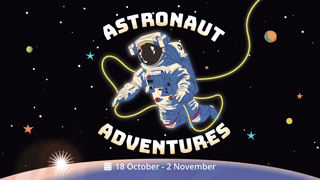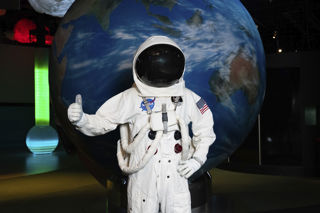
5 Ways to Continue Your Astronaut Adventures
- 17th Oct 2025
- Author: Elliott Langley - Marketing Administrator

If you're coming to visit the National Space Centre this October half-term, then you're about to find out just what it takes to become an astronaut... spoiler: it's not easy!
Thanks to our Public Programmes team, the school holiday period is packed with science talks, hands-on activities, and interactive fun. It's such a pleasure to watch people of all ages having their minds blown by the challenges we face every time we send a human being into space.
But if you've left the National Space Centre as a future "astronaut in the making", you might be wondering what's next? Well, you're in luck; our Content team have a few ideas to help you continue your astronaut adventures at home.
Mission Bake
If your're looking to take your astronaut training into the kitchen, then Dr Josh Smalley is here to show you how to make gingerbread rockets in a special episode of our Mission Bake series.
Ingredients:
- 120g unsalted butter
- 120g light muscovado sugar
- 60g black treacle
- 60g golden syrup
- 1 large egg (beaten)
- 410g self-raising flour
- 1 tsp ground ginger
- 300g icing sugar
- 30g egg white
- 1-2 tbsp water (plus more to make icing)
colours
Live like an Astronaut
Do you think you could live like an astronaut? On board the International Space Station (ISS), astronauts' schedules are often jam-packed with tasks including conducting research, performing science experiments, venturing out on a spacewalk and even live calling schools down on Earth.
We challenged Ed to live like an astronaut to highlight the differences between living on Earth and how astronauts sleep, exercise, eat, spacewalk and relax. Why not have a go at some of the activities yourself and consider how it would be different in space compared to here on Earth?
Make an Astronaut Costume
Whether it’s for Halloween, World Book Day or because you’re training to travel to space, Claire's got a our step-by-step guide to making your very own astronaut costume.
You will need:
- Cardboard boxes
- Plastic bottles
- Tin foil
- Bottle tops
- Tape or glue
- Ribbons or string
- Paint
Make sure to share your creations with us!
Why do we Grow Taller in Space?
Try your own experiment here on Earth to look at the effects of gravity on the human body.
Measure your height in the morning and again before you go to bed in the evening. Did you grow taller or get shorter?
Join Claire to find out why astronauts grow about 5cm on the International Space Station.
Grossology
Just in time for Halloween, Katie has a list of absolutely revolting facts about the gross side of space travel. Here's a few highlights in you want to feel thoroughly grossed-out!🤢
- Passing gas can be quite an issue in space, due to the lack of gravity. Every time you try to burp in space, you throw up in your mouth. It’s very important that astronauts burp with their mouths closed, so they don’t throw up all over their crewmates.
- Learning how to use the toilet in space requires extensive training. Most space toilets use a light suction, a bit like a vacuum cleaner.
- Astronauts can’t take a typical shower in space because the microgravity causes the water to pool together into floating globs. Instead, astronauts use pre-mixed soapy water from small pouches to wash themselves.
- Some spacecraft recycle astronaut wee into drinking water. The ISS has an advanced water reclamation system that can recycle moisture from the air. This includes an astronaut’s sweat, the moisture in their breath and the damp from their dirty towels!
- With no sinks to spit into, and little desire to keep a dirty toothpaste-covered rag around the place, astronauts have to swallow their toothpaste.
- Astronauts have to exercise for around 2.5 hours every day while in space. Their clothes can get very sweaty. Since water is such a precious resource, they can’t have washing machines up there. Instead, they just wear the same clothes until they can’t bear the smell anymore and dirty clothes are simply thrown away with other waste to burn up in Earth’s atmosphere.
- On Earth, a thick layer of skin grows on the bottom of our feet, which is worn down and regrows as we walk around. Skin on your feet in space grows and grows and eventually begins to shed, sending particles of dead skin to float around the cabin.

Share your Journey With us!
We would love to see your creations, so be sure to share your continuing Astronaut Adventures with us!
Thank you so much to everyone visiting during the October half-term and supporting the charity! All of our school holidays are included in the free Annual Pass upgrade so we sincerely hope that we can welcome you back during the next half-term!


